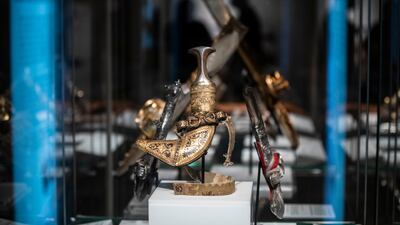The Sharjah Heritage Museum’s current exhibition offers a fascinating look into the generations-old craft and design of the Emirati dagger, known in Arabic as a khanjar or khanyar.
The 'Dagger Craftsmanship in the UAE — A Craft of Authenticity and Creativity' exhibition explores this manufacturing tradition through the work of one family.
The art form is an essential part of the UAE’s cultural heritage.
“My father would be astonished to see this exhibition and surprised to see his work here,” Halima Abdullah Rashid tells The National.

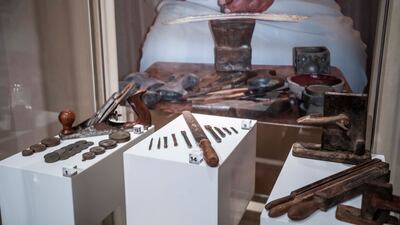

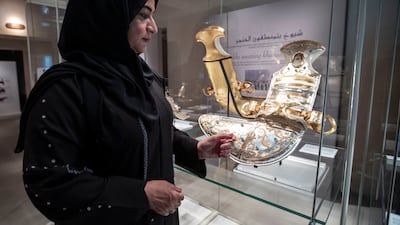
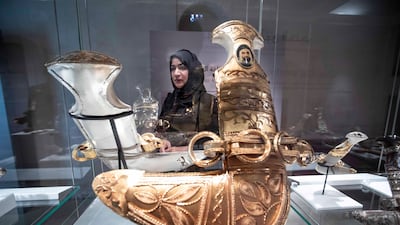
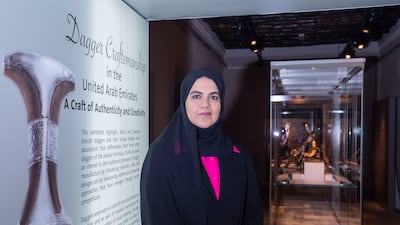
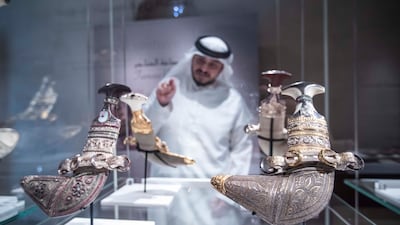

For generations, Rashid’s family has specialised in crafting swords and daggers. Many of the weapons and tools on display are the creations of her father and family members.
“This craft was their life, it was their routine,” she says.
“They never thought of it as something out of the ordinary, even though they were truly artists and designers.”
Rashid is a jewellery and dagger designer, who made two of the blades on display at the exhibition.
One is a 24-K gold plated dagger adorned with an image of UAE Founding Father, the late Sheikh Zayed bin Sultan Al Nahyan. Her design was awarded the largest dagger title by the Sea of Culture Foundation in 2018 in the Emirates National Records, under the Community Service and Love of Country category.
“The khanjar is a symbol of masculinity and courage — the idea of masculinity from a Bedouin perspective,” she says.
“There are many stories where the khanjar is always a symbol of this courage and bravery, which is important to Bedouin culture.”
Historically, daggers were carried for personal protection and hunting purposes. They were effectively part of everyday garb for many Bedouin, Emiratis and various Arab peoples from the region.
Emirati daggers consisted of a high-quality iron blade, attached to a hilt made from ivory — which has since been replaced with buffalo horn. They were completed with a curved soft leather sheath — adorned with silver and gold threads — attached to a woven belt.
Traditionally, a boy would be given his first dagger at the age of 10, symbolising his coming of age and entering adulthood.
Today, the dagger is considered an ornamental piece, worn on special occasions and for official ceremonies — often given as diplomatic gifts or awarded as a prize in competitions.
The Sharjah exhibition includes a collection of tools made by Rashid's father, Abdullah Rashid Al Naabi, who used to craft daggers and swords for more than 40 years at his home workshop in Al Rashidiya, Dubai.
Many of the items he sold across the region and the world are now on display. In particular, the exhibition focuses on the sahili and shamali daggers, distinctive by their size, shape and design.
Rashid first started researching Emirati daggers in 2003. She has since documented how her father and other members of her family laboured in their workshops, interviewing them and writing several books on the topic.
“The khanjar also has many elements of beauty, especially the Emirati khanjar,” Rashid adds.
“It has an important place, historically, artistically, in families and in society. The khanjar itself has 15 parts, and each of these parts has its own detail and history.”
The exhibition very clearly displays, through informative and approachable curation, the history and methods of creating the Emirati dagger and Rashid’s family’s connection to the history of the craft.
While educating visitors on this history, the exhibition also displays intricately designed pieces that highlight the craftsmanship, in the hope of inspiring curiosity and pride in younger generations of Emiratis.

“Visitors to the museum have come from all over and have been from many different groups and ages,” says Noura Almoughanni, curator of the exhibition.
“For children it has been something completely new and interesting. Most of them aren’t used to seeing anyone from their family owning a dagger or any of the men in their family carrying it.”
Almoughanni also says millennials and Gen Z were under the impression that the khanjar came from other countries in the region, not from the UAE.
Many of them, she noted, asked questions about the origins and influences of the Emirati dagger and were “able to learn that the dagger is an important element in the history of the country and the Emirati people".
Rashid, who is proud of her family’s contribution to the tradition, hopes that more Emiratis and Arabs can learn about the UAE's daggers and their relevance to regional culture.
“I hope that first of all people and Emiratis will learn about this period of their culture,” Rashid says.
“This is our identity," she adds. "I saw a mother with her children visiting the exhibition one day and they were all so astonished by the displays and the beauty of the designs. Children in particular are fascinated by them.”
The Dagger Craftsmanship in the UAE – A Craft of Authenticity and Creativity exhibition is running at the Sharjah History Museum until May 24
